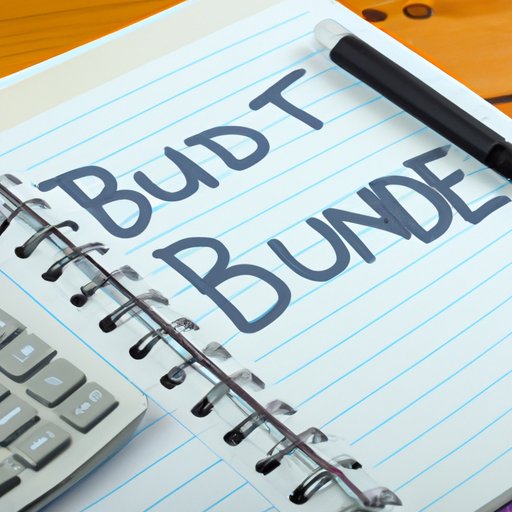Introduction
Managing your home finances can be complicated and overwhelming. To take control of your finances, you need to understand the basics of home finance and develop a plan for staying organized. This article will provide a comprehensive guide to organizing your home finances so that you can achieve your financial goals.
Definition of Home Finances
Home finances refer to all the money that comes into and goes out of your household. This includes income from wages, investments, rental properties, or other sources, as well as expenses such as mortgage payments, utilities, taxes, and more. Managing your home finances involves tracking income and expenses, setting up budgets, and making sure that you are saving money and not overspending.

Overview of Problems with Home Finances
Many people struggle to stay on top of their home finances. Without a plan in place, it is easy to get overwhelmed by bills, forget to pay them on time, or overspend. This can lead to credit card debt, late fees, and other financial problems. It is important to have a plan in place to help you stay organized and make sure that you are taking advantage of all available resources.

Identify Financial Goals and Priorities
The first step to organizing your home finances is to identify your financial goals and priorities. This will help you determine where to allocate your resources and develop a plan for achieving your goals.
Determine Your Short-Term and Long-Term Financial Goals
Before you can start organizing your home finances, you need to determine what your short-term and long-term financial goals are. This could include things like paying off debt, building up an emergency fund, investing in stocks or mutual funds, or saving for retirement. Once you have identified your goals, you can begin to develop a plan for achieving them.
Make a List of Your Financial Priorities
Once you have identified your financial goals, you should make a list of your financial priorities. This list should include items such as paying off debt, saving for retirement, or investing in stocks or mutual funds. This will help you stay focused on the most important tasks and ensure that you are making progress towards your goals.
Consider How Much Time You Have to Achieve Your Goals
When creating your financial plan, it is important to consider how much time you have to achieve your goals. If you have a limited amount of time, you may need to prioritize certain tasks over others. For example, if you are trying to save for retirement but only have a few years left before you retire, you may want to focus on investing in stocks or mutual funds rather than paying off debt.

Create a Budget and Track Spending
Creating a budget and tracking your spending is one of the most important steps in organizing your home finances. A budget will help you keep track of your income and expenses, and make sure that you are not spending more than you can afford.
Set Up a Monthly Budget
The first step in creating a budget is to set up a monthly budget. This should include all of your income and expenses, including rent or mortgage payments, utility bills, groceries, and other items. Make sure to include any regular expenses that you may have forgotten, such as car payments or subscription services. Once you have created your budget, you should review it regularly to make sure that you are staying on track.
Track Your Spending
In addition to setting up a budget, it is also important to track your spending. This will help you stay on top of your finances and ensure that you are not overspending. You can track your spending by keeping receipts and writing down all of your purchases in a journal or spreadsheet.
Make Adjustments as Necessary
Once you have created a budget and started tracking your spending, you should make adjustments as necessary. If you find that you are spending too much in certain areas, try to cut back and redirect the money towards savings or investments. You should also review your budget periodically to make sure that it is still accurate and up to date.
Take Advantage of Tax Benefits
Taxes can have a significant impact on your home finances, so it is important to take advantage of all available tax benefits. Understanding tax deductions and credits can help you reduce your taxable income and potentially lower your overall tax bill.
Understand Tax Deductions and Credits
Tax deductions and credits can help reduce your taxable income and lower your overall tax bill. Common tax deductions include mortgage interest, student loan interest, charitable donations, and medical expenses. Tax credits are also available for certain expenses, such as childcare costs or energy efficient home improvements.
Consider Filing Jointly if Married
If you are married, you may want to consider filing jointly with your spouse. Filing jointly can result in a lower tax rate and may even qualify you for additional tax credits. However, it is important to understand the implications of filing jointly before making a decision.
Utilize Retirement Accounts
Retirement accounts are a great way to save for the future and take advantage of tax benefits. Contributions to retirement accounts, such as 401(k)s or IRAs, can be deducted from your taxable income. Additionally, any earnings from these accounts are not taxed until you begin withdrawing money.
Automate Savings and Payments
Automating your savings and payments can help you stay on top of your finances and ensure that you are meeting your financial goals. Setting up automatic transfers to savings and investments can help you build wealth and prepare for the future.
Set Up Regular Automatic Payments
Setting up regular automatic payments is a great way to ensure that you are always on top of your bills. This will help you avoid late fees and penalties and make sure that you are staying on track with your budget.
Automate Transfers to Savings
Automating transfers to savings is another great way to stay on top of your finances. You can set up automatic transfers from your checking account to a savings account on a regular basis, or you can transfer a fixed amount each month. This will help you build up an emergency fund and prepare for the future.
Invest in Mutual Funds or ETFs
Investing in mutual funds or exchange-traded funds (ETFs) is another great way to automate your savings. Mutual funds and ETFs allow you to diversify your investments without having to actively manage them. You can set up automatic transfers from your checking account to a mutual fund or ETF on a regular basis, or you can invest a lump sum of money.
Establish an Emergency Fund
Having an emergency fund is an important part of staying organized with your finances. An emergency fund can help you cover unexpected expenses, such as medical bills or car repairs, without going into debt.
Estimate How Much Should Be Saved
Before you can start saving for an emergency fund, you should estimate how much money you should be saving. Generally, experts recommend that you save enough to cover three to six months of living expenses. This will help ensure that you are prepared for any unexpected expenses that may arise.
Open a Separate Account for Emergencies
Once you have estimated how much you should be saving for an emergency fund, you should open a separate account specifically for this purpose. This will help ensure that the money is readily available when you need it and that you are not tempted to spend it on other things.
Consider Investing the Money
Once you have opened a separate account for your emergency fund, you may want to consider investing the money. Investing the money can help it grow faster over time, but it is important to remember that investing involves risk. Before investing your emergency fund, you should consult with a financial advisor to determine the best course of action.
Educate Yourself About Financial Planning
Finally, it is important to educate yourself about financial planning. Reading books and articles, taking classes, and consulting with a professional can help you gain a better understanding of personal finance and learn how to manage your money effectively.
Read Books and Articles
Reading books and articles about personal finance is a great way to learn more about money management. There are many books and online resources available that can help you gain a better understanding of budgeting, investing, taxes, and other topics related to personal finance.
Take Classes
Taking classes on personal finance is another great way to learn more about money management. Many universities, community colleges, and private organizations offer classes on budgeting, investing, and other topics related to personal finance.
Consult with a Professional
Finally, consulting with a professional financial planner or accountant can help you gain a better understanding of your finances. A professional can help you develop a financial plan and provide advice on how to make the most of your money.
Conclusion
Organizing your home finances can be a daunting task, but it doesn’t have to be. By following the steps outlined in this article, you can take control of your finances and make sure that you are on track to reach your financial goals. From setting up a budget and tracking spending to taking advantage of tax benefits and automating savings, organizing your home finances is an achievable goal.
Summary of Home Finances
Organizing your home finances involves identifying financial goals and priorities, creating a budget and tracking spending, taking advantage of tax benefits, automating savings and payments, establishing an emergency fund, and educating yourself about financial planning.
Benefits of Proper Financial Planning
Proper financial planning can help you stay organized, reduce stress, and achieve your financial goals. It can also help you save money, reduce debt, and build wealth for the future.
(Note: Is this article not meeting your expectations? Do you have knowledge or insights to share? Unlock new opportunities and expand your reach by joining our authors team. Click Registration to join us and share your expertise with our readers.)
